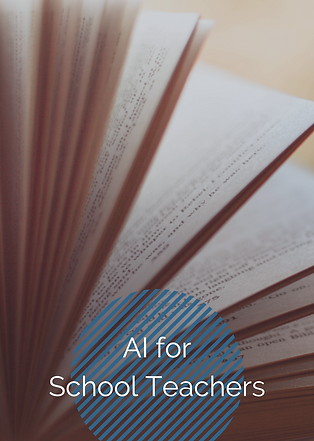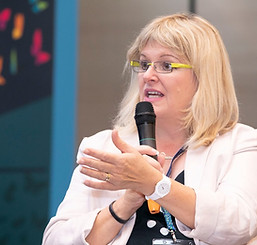Everyone needs to have basic AI and Data Literacy to consciously engage safely with AI technology.
How will we help people learn how to learn and work ethically and effectively alongside smarter digital tools driven by AI? Public campaigns will surely play a part, but education: school-age education, national curriculums, and initiatives for lifelong learning, will be critical channels for engagement. Focusing on teachers, the front line, those with the toughest jobs, those preparing people to build and operate in our increasingly AI-supported societies, will be invaluable.
Introduction
Too many people are getting left behind. The digital divide is widening with increased inequality and the AI ecosystem is failing to inspire or earn the trust of the public. This new technology, AI, feels inaccessible or is inaccessible. It’s believed to be overhyped or unclear and ultimately people end up believing that it isn’t for them. In order for AI to bring around benefits for society and the economy, everyone needs to be involved in some way: whether that’s building, living, working, or playing with this technology, it’s now clear everyone needs to have basic AI and Data Literacy to consciously engage safely. How will we inspire people to pursue careers in AI? How will we help people learn how to learn and work ethically and effectively alongside smarter digital tools driven by AI? Public campaigns will surely play a part, but education: school-age education, national curriculums, and initiatives for lifelong learning, will be critical channels for this engagement. Focusing on teachers, the front line, those with the toughest jobs, those preparing people to build and operate in our increasingly AI-supported societies will be invaluable.
Until now, teachers have been in a position similar to the majority of the general public. AI was a “too busy to bother” area that they did not understand or particularly trust, and given competing priorities, they did not feel great pressure to understand. But with education technologies being thrust front and centre during the pandemic, there has been a shift. AI is now increasingly seen as a valuable tool for teaching and learning, and a critical component of the knowledge people will need to flourish. The pressure for teachers to understand and shape this new arena has well and truly arrived.
The influence of AI will touch teaching and learning tools across the piste, and the implications of its use have bearing across all subjects whether it be English, maths, geography, or philosophy. What is needed is a general understanding of the ingredients that comprise AI, and the ways we are able to combine them for the realisation of human potential. With the book this Byte-Sized EdTech Research covers, Professor Rose Luckin, Karine George, and Associate Professor Mutlu Cukorva, have provided teachers with an all-access pass to one of the most important public conversations of the 21st Century. Jump in, enjoy the ride, and then take everyone you can with you!
(Introduction adapted from Foreword by Tabitha Goldstaub, MBE, Creator of How to Talk to Robots, Cofounder of CogX, and Chair of UK Govt. AI Council)

Keywords
Good Old-Fashion AI, black box, supervised machine learning, unsupervised machine learning, transparency, AI Readiness Framework, ethics in AI, AI for school teachers
About the Authors:
Professor Rose Luckin
Rosemary (Rose) Luckin is Professor of Learner Centred Design at UCL Knowledge Lab. She was named one of the 20 most influential people in education in the Seldon List, 2017.
Rose is Founder of EDUCATE Ventures Research Ltd., a London hub for start-ups, researchers and educators developing evidence-based educational technology. She is past president and current treasurer of the International Society for AI in Education and co-founder of the Institute for Ethical AI in Education. Rose’s 2018 book, Machine Learning and Human Intelligence: The Future of Education for the 21st Century, describes how AI supports teaching and learning. Prior to joining the UCL Knowledge Lab in 2006, Rose was Pro-Vice Chancellor for Teaching and Learning at the University of Sussex

Karine George
An award-winning, future reimagining educationalist, Karine spent more than 20 years as headteacher in an 'Outstanding' Oftsed-rated school, She is an active research practitioner and ties research, business and education together to transform leadership and pedagogy. An advocate for technology's support of 21st century teaching and learning, she has reported on its use to the DfE, penned numerous articles on educational issues and was a contributing author for 'Sustainable School Transformation: an inside-out school-led approach'.

